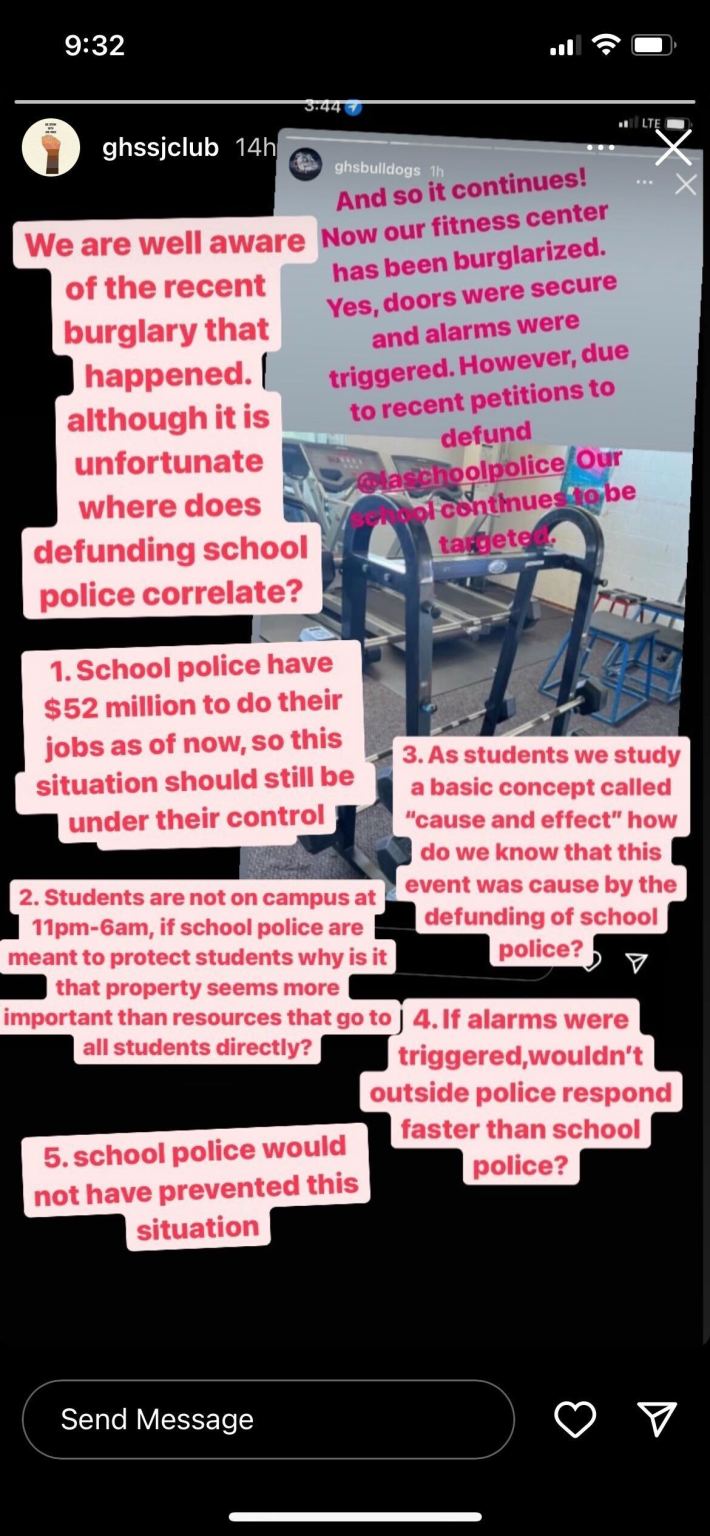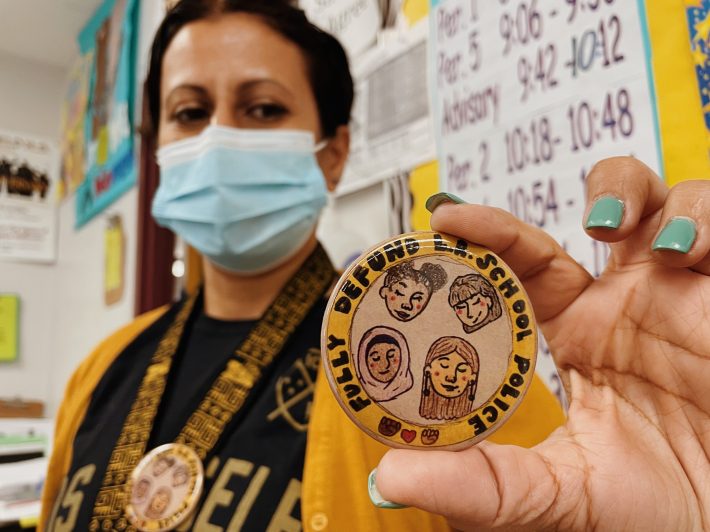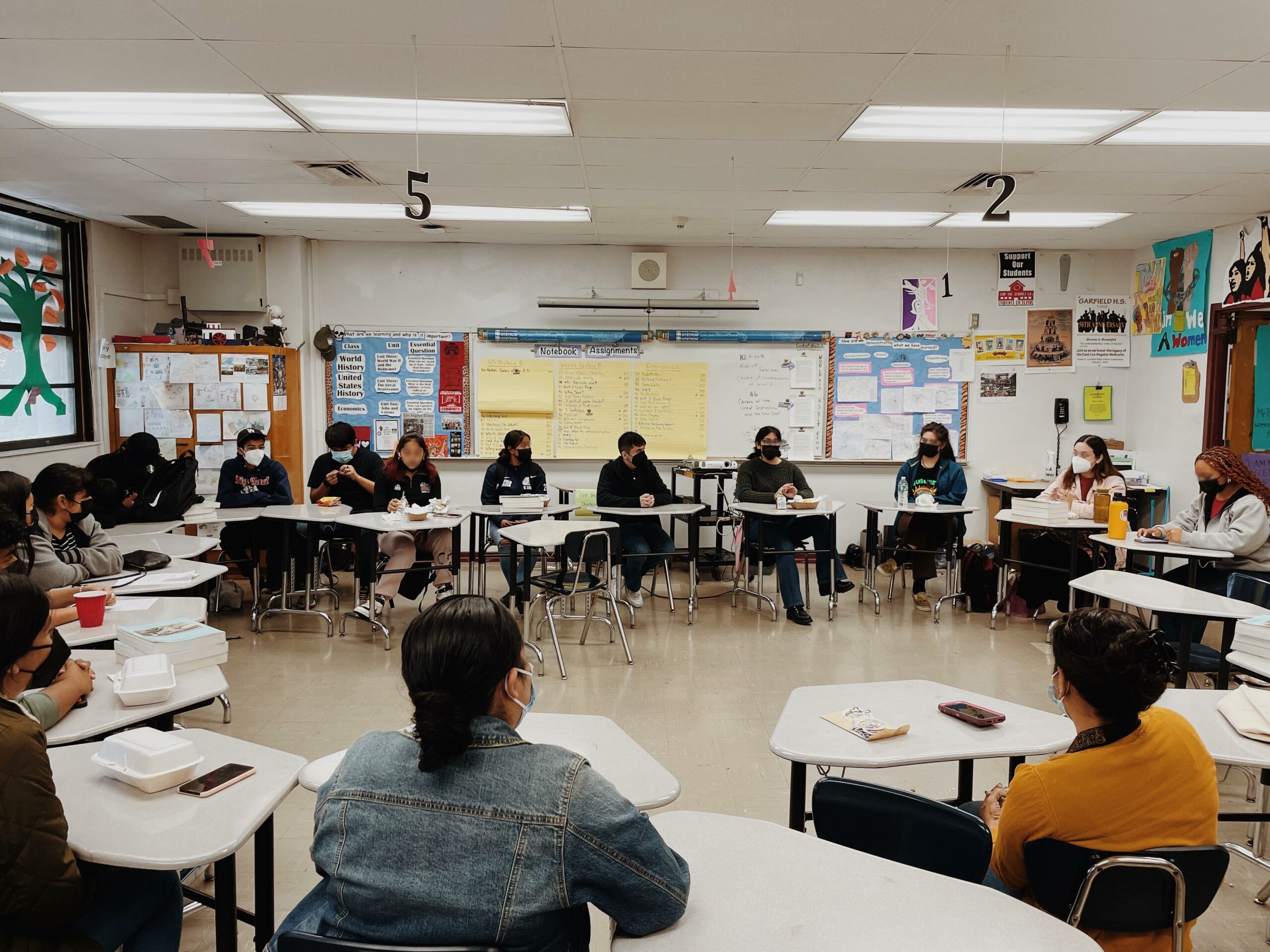Welcome to L.A. TACO’s new monthly education column, “The L.A. Public School Report.” If you have any story tips, send them to janette@lataco.com for consideration.
It’s 11:35 AM at Garfield High School, and it’s time for lunch. A group of juniors and seniors walk up the stairs with their chicken sandwiches in hand and gather in room 125. “We’re here for the social justice club, right?” asked one student. Before beginning the day's discussion, the group welcomes new students. Sitting in a circle, they share their reasons for joining the club.
“I come here almost every Wednesday. I really like the tight-knit community we have created here, and I like that we talk about important issues that are going on in our community and what we can do to bring awareness to these issues on campus,” said Kheyla Lindsey, a senior at Garfield High School.
The club meets every Wednesday in Erica Huerta’s or “Ms. Huerta’s,” as the students respectfully call her, classroom. That day's main discussion centered around a recent break-in on campus, which resulted in gym equipment being stolen. Not much information was given on the robbery other than it happened between 11 PM and 6 AM a week ago. According to students, some folk on-campus expressed the need for more police presence after this incident. An Instagram story posted to the Garfield football team’s account stated, “due to recent petitions to defund campus police, our school continues to be targeted.” Students on campus believe that the “petition” they spoke of was referring to a Students Deserve campaign. A group made up of students across the Los Angeles Unified School District that has been fighting and asking the district to defund school police completely and instead allocate the money towards more resources for students and staff.

“With the murder of George Floyd and the rise in consciousness about the role that police take in society, I think it just awakened students even more, and they saw the need to reallocate those funds,” said Huerta. “And it’s unfortunate that anytime there is an incident like this or a fight, some among our staff will say, ‘and some people want to defund our police.’ Our response is that crime has always happened and will continue to happen whether there are school police or not. ”
Social Justice clubs like that at Garfield are associated and often work closely with groups like Students Deserve. Earlier this month, students at Garfield began to pass out yellow pins that read “Fully Defund LA School Police” as part of their district-wide campaign. According to Ms. Huerta, around 25,000 pins have been passed out across 75 different schools. This action, followed by the robbery and response from the football account, caused some students at Garfield's social justice club to wonder why their campaign was being targeted as the cause of recent robberies.
“We’re not the thieves. I understand that someone breaking into the fitness room is detrimental to all of Garfield sports because we all use the gym, but why are we being blamed for it when we weren't here,” shared Lindsey to her club mates.
“These campaigns that we’re doing don't cause crimes to go up. There are no petitions or asking for signatures, and we’re not forcing anyone who doesn't want a pin to take one,” added Citlalic Arechiga, a senior student. “There were no facts to support this claim that it was our fault, our whole point is to educate and bring awareness, but campus police does not equal safety.”
Arechiga is correct. An ACLU study showed that having police on campus does not guarantee a safer campus, and in some cases, it harms students. Paritucaly, students of color and low-income students are often targeted by law enforcement in and out of campus. The ACLU study showed how the presence of police does not always represent the same thing for white and Black students, nor do they serve students the same. The 2021 published study found that school police in a district serving predominantly white students were more concerned about potential external dangers versus police serving Black and Brown students, where police “were primarily concerned with students themselves as threats,” not outside dangers.

In a press release for the study, Amir Whitaker, senior policy counsel with the ACLU Foundation of Southern California, said: “The data reveals troubling trends endemic to racist and oppressive policing at large. Officers racially profile students of color and handcuff them as young as eight years old.”
Along with the ACLU, Students Deserve also surveyed a little over 5,000 students across LAUSD and found that 87% of students favored entirely defunding police on campus.
When asked what defunding police on campuses means to them, Simya Smith, a Junior at Dorsey High School, put it simply.
“Defunding police on campus means taking our freedom back and providing our communities with the resources it needs. We’re taking away money from racism, white supremacy, and that’s what we’re defunding,” she said. “We deserve to put that money into our schools to guarantee our success.”
Although LAUSD has not entirely defunded on-campus police, students have won several of their campaigns for change. For this school year, police are no longer allowed on campus. Also, the board of education that finalized the decision cut a third of its officers. Along with this, the use of pepper spray by police on students was banned, and the end of random searches. More importantly, $25 million in funds were cut from the Los Angeles School Police Department to fund a Black Student Achievement Plan. The funds being moved to help Black students are a small glimpse of how the money used to support police can help students with essential resources.
L.A. TACO sent an email to LAUSD for comment on this situation. They responded by saying that they "do not have a statement," and instead provided the above link providing "robust information about Black Student Achievement Plan."
“It’s a big win, but we need more. Students desperately want more access to counseling services, mental health services, and even things like better food,” said Huerta. “The students are amazing and are really the leaders of this. As educators and adults, if we are really trying to help these students succeed, we need to make sure that we listen to them and what they need most.”







